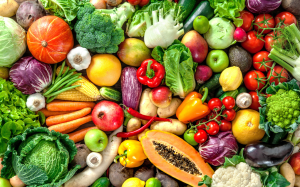Dr. Richa Bhatia
Phytochemicals in Diet
(Eating a Rainbow!)
Phytochemicals are chemicals produced by plants, generally to help them resist fungi, bacteria and virus infections; as also consumption by insects and other animals. Phytochemicals can be derived from various sources such as whole grains, fruits, vegetables, nuts, herbs; and more than a thousand phytochemicals have been discovered to date. Recent scientific studies have established a relationship between the consumption of phytochemicals with health benefits such as prevention of diabetes, obesity, and cardiovascular diseases. The health benefits of these phytochemicals depend on their purity and structural stability. Some of the significant phytochemicals are: carotenoids, polyphenols, isoprenoids, phytosterols, saponins, dietary fibers and certain polysaccharides.

Carotenoids
Carotenoids are bright yellow, red, and orange-colored pigments found in plants, algae, and photo-synthetic bacteria. Fruits are explicitly rich in carotenoids, whereas some vegetables also possess carotenoids in good amounts. They are abundantly found in carrots, tomatoes, parsley, orange, radish, cabbage, spinach, fenugreek, purple turnip and green leafy vegetables. Commonly found carotenoids are α-carotene, β-carotene, Lutein, and Fucoxanthin. Lutein also plays an important role in vision. Fucoxanthin is reported to exhibit anti-hypertensive, anti-inflammatory and anti-obesity effects.
Polyphenols
Polyphenols are abundantly found in spinach, broccoli, flax, onion, apple, plum, pear, grapes and cherry. Olive oil, tea and red wine are considered good sources of polyphenols. Health benefits of polyphenols include action against free radicals; protective effects against cardiovascular diseases and other age-related diseases; and prevention of inflammation allergies.
Isoprenoids
Isoprenoids are found in eucalyptus, turpentine, lime, orange, and cannabis. Isoprenoids are useful in the reduction of appetite, stress, and anxiety, support digestion, have antioxidant potential, promote sleep and help in pain relief.
Phytosterols
Phytosterol are abundant in olive oil, sesame, sunflower, peanuts, macadamia, nuts, beans, and almonds. Health benefits of phytosterols include support for prostate health, hair growth, reduction in LDL cholesterol, and high antioxidant activity.
Saponins
Saponins are abundant in the legumes viz. black gram, pigeon pea, and common bean. These exhibit antifungal, antimicrobial, virucidal, hypo-glycemic and hypo-lipidemic activity. The impact of saponins on acute injuries and venous edema has been also reported.
Polysaccharides and Dietary Fibers
Polysaccharides are a group of monomer sugar units linked by glycosidic linkage. They may be storehouses of energy (starch and glycogen) or non-digestible components (dietary fiber). These components are not digested by human digestive enzymes but are broken down by the gut micro-biota in the large intestine, where they support the growth of healthy micro-organisms. Some rich sources of dietary fiber are – beans, barley, corn, oats and wheat. Regular consumption of dietary fiber helps to prevent inflammation, hypertension, hyper-lipidemia, obesity, cardiovascular diseases, and improves insulin sensitivity.
Conclusion
Eating a diet high in fruits, vegetables, grains, legumes and plant-based beverages has long term health benefits, but there is no evidence that taking dietary supplements of non-nutrient phytochemicals extracted from plants benefits health. It is generally recommended that if you eat a variety of fruits and vegetables (especially of rainbow colors), you need not worry about individual phytochemicals.



